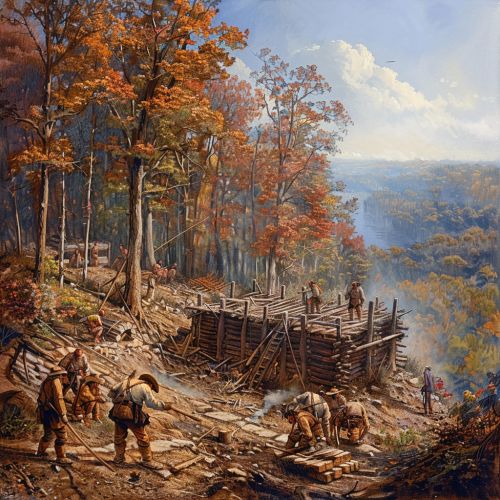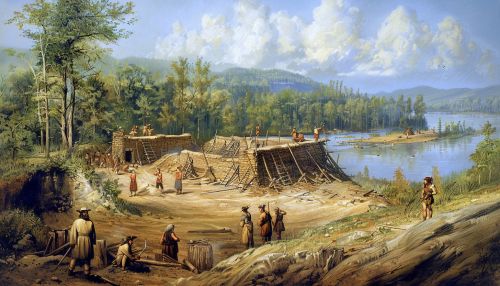History of Kentucky: Difference between revisions
(Created page with "== Pre-Colonial Era == The area now known as Kentucky was inhabited by various indigenous peoples for thousands of years before European contact. The most notable of these were the Adena and Mississippian cultures, which left behind numerous earthworks and mounds. These cultures were primarily agrarian, relying on maize agriculture, supplemented by hunting and gathering. The Shawnee, Cherokee, and Chickasaw were amo...") |
No edit summary |
||
| Line 9: | Line 9: | ||
The first permanent European settlement in Kentucky was established by [[James Harrod]] in 1774, known as [[Harrodsburg]]. This period was marked by frequent conflicts between settlers and indigenous tribes, who were determined to defend their lands. The [[American Revolutionary War|Revolutionary War]] exacerbated these conflicts, as British forces allied with various tribes to resist American expansion. | The first permanent European settlement in Kentucky was established by [[James Harrod]] in 1774, known as [[Harrodsburg]]. This period was marked by frequent conflicts between settlers and indigenous tribes, who were determined to defend their lands. The [[American Revolutionary War|Revolutionary War]] exacerbated these conflicts, as British forces allied with various tribes to resist American expansion. | ||
[[Image:Detail-96045.jpg|thumb|center|Depiction of early European settlers building a fort in the Kentucky wilderness.|class=only_on_mobile]] | |||
[[Image:Detail-96046.jpg|thumb|center|Depiction of early European settlers building a fort in the Kentucky wilderness.|class=only_on_desktop]] | |||
== Statehood and Early Development == | == Statehood and Early Development == | ||
Latest revision as of 02:36, 4 July 2024
Pre-Colonial Era
The area now known as Kentucky was inhabited by various indigenous peoples for thousands of years before European contact. The most notable of these were the Adena and Mississippian cultures, which left behind numerous earthworks and mounds. These cultures were primarily agrarian, relying on maize agriculture, supplemented by hunting and gathering. The Shawnee, Cherokee, and Chickasaw were among the tribes that inhabited the region by the time Europeans arrived.
European Exploration and Settlement
Early Exploration
The first Europeans to explore Kentucky were likely Spanish explorers in the 16th century, though there is little concrete evidence of their presence. More definitive exploration began in the late 17th century with French explorers such as La Salle, who claimed the region for France. However, it was not until the mid-18th century that European settlers began to move into Kentucky in significant numbers.
Settlement and Conflict
The first permanent European settlement in Kentucky was established by James Harrod in 1774, known as Harrodsburg. This period was marked by frequent conflicts between settlers and indigenous tribes, who were determined to defend their lands. The Revolutionary War exacerbated these conflicts, as British forces allied with various tribes to resist American expansion.


Statehood and Early Development
Admission to the Union
Kentucky was admitted to the Union as the 15th state on June 1, 1792. The process of achieving statehood was complex, involving multiple conventions and negotiations with the state of Virginia, from which Kentucky was formed. The first governor of Kentucky was Isaac Shelby, a Revolutionary War hero.
Early Economy and Society
In its early years, Kentucky's economy was primarily agrarian, with tobacco and hemp as the main cash crops. The state also became known for its horse breeding and racing industry, which remains significant to this day. Slavery was a contentious issue, with a significant portion of the population enslaved by the early 19th century.
Civil War Era
Divided Loyalties
Kentucky's position during the American Civil War was unique. Although it was a slave state, it did not secede from the Union. The state declared itself neutral at the war's outset, but this neutrality was short-lived. Both Union and Confederate forces occupied Kentucky at various times, and the state was the site of several significant battles, including the Battle of Perryville.
Post-War Reconstruction
The end of the Civil War brought significant changes to Kentucky. The abolition of slavery disrupted the state's agrarian economy, leading to a period of economic hardship and social upheaval. Reconstruction efforts were complicated by lingering Confederate sympathies and resistance to federal policies.
20th Century Developments
Economic Transformation
The early 20th century saw Kentucky transition from an agrarian economy to a more diversified one. The coal mining industry became a major economic driver, particularly in the eastern part of the state. This period also saw significant labor unrest, with numerous strikes and conflicts between miners and coal companies.
Social and Political Changes
The Civil Rights Movement of the 1960s brought significant social changes to Kentucky. The state was the site of several important events, including the desegregation of public schools and the passage of civil rights legislation. Political power in the state also began to shift, with urban areas gaining more influence relative to rural regions.
Modern Era
Economic Challenges and Opportunities
In recent decades, Kentucky has faced numerous economic challenges, including the decline of the coal industry and the need to diversify its economy. However, the state has also seen growth in sectors such as manufacturing, healthcare, and technology. Efforts to improve education and infrastructure have been central to these economic development strategies.
Cultural and Social Trends
Kentucky remains known for its rich cultural heritage, including its contributions to music, literature, and cuisine. The state is famous for its Kentucky Derby, bourbon distilleries, and bluegrass music. Social issues such as healthcare, education, and economic inequality continue to be important topics of public discourse.
See Also
- Adena culture
- Mississippian culture
- René-Robert Cavelier, Sieur de La Salle
- James Harrod
- American Revolutionary War
- Isaac Shelby
- American Civil War
- Battle of Perryville
- Civil Rights Movement
- Kentucky Derby
